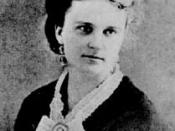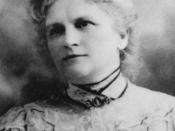Kate Chopin's second and final novel, The Awakening, was published in 1899 at the height of
her popularity. Ironically, this work, now regarded as a classic, essentially marked the end of
Chopin's writing career. The Awakening has now earned a place in the literary canon for the
way it uses these formal and structural techniques to explore themes of marriage,
motherhood and woman's independence, desire, and sexuality. In my opinion all these issues
are best seen in the last chapter. That's why I am to write about it.
Chapter XXXIX begins on Grand Isle. Victor and Mariequita flirt and discuss Edna's
dinner party while Victor does construction work. Unexpectedly, they see Edna walking
toward them. It is still long before the summer season, but Edna explains that she has come
alone to the island in order to rest. She makes plans to have lunch with the pair and then walks
down to the beach for a swim, ignoring Victor and Mariequita's claims that the water is much
too cold.
As she walks along the beach, Edna's thoughts are utterly different. Once she
reaches the water, she removes the garment with no one in sight. Edna stands "naked in the
open air, at the mercy of the sun, the breeze that beat upon her, and the waves that invited
her." She swims out into the water. Eventually tiredness goes beyond her. The recollections of
her early days fill her thoughts as she gives up to the expanse of the deep.
First thing I would like to describe is deconstruction. I would like to point that the last
scene brings the variety of meanings and interpretations. On the one hand, the suicide is an act
of final capitulation to the power of social traditions. On the other hand such a surrender...


